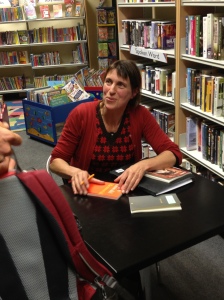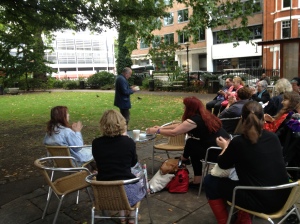Saturday was a busy poetry day. In the morning I went into London to a meeting of the Tideway Poets at the South Bank Centre. This is a group that used to meet at the Poetry School for Jane Draycott’s Saturday Sessions – a really useful and inspiring poetry workshop. When Jane decided she needed a break from teaching, her students kept on meeting, and over a year later the group is still going strong. Our workshopping wrapped up at about three o’clock, then I legged it back through London, despite Transport for London’s best efforts to delay me, and got home just after five. I collected my Other Half and we set off into the sunset, to Swindon, for a very special poetry event; the prizegiving for Cristina Newton’s Battered Moons poetry competition – part of the Swindon Festival of Poetry.
One of my Tideway colleagues was there; Ruth Wiggins was commended in the competition and read her mysterious poem (beautifully) which is entitled: “Confession: I’ve been crumbling antihistamines into your food all week”. Here’s Ruth, posing in Swindon Arts Centre with the festival mascot, who I am told is called Ophelia Dog.
All the competition poems were of a really high standard. Thanks to Cristina, you can read them here.
The judge of the competition was the marvellous Alice Oswald, who read for us in the second half of the evening. Oswald is a fantastic writer, and also speaks all her poems from memory, which makes the whole event so special. I’d already got all her books, but bought another copy of Dart just so she could sign it for me afterwards. (However hard I try, I can’t resolve her signature into the name ‘A. Oswald’. It looks as though she wrote ‘Moomin’, which must be a Secret Message.) I had the chance to speak to her and congratulated her on memorising her poems. She told me it has become ‘a bit of a fixation – it’s all about the oral storytelling tradition’. She has, on occasion, recited the whole of her book ‘Memorial’ from…um… memory. She performed the last few stanzas of it for us on Saturday night, along with a section from Dart and many of her nature poems.
I admire Oswald so much for ploughing her own poetic furrow down in Devon. She doesn’t clamour at the social media – as far as I know she doesn’t tweet, doesn’t have a facebook page, doesn’t blog. It’s hard to find anything of her on YouTube. She occasionally writes for the Guardian, is diffident about judging competitions, and diligently gets on with the writing that matters to her. Now Seamus has gone, she may be the finest poet writing in English today. I did get the chance to tell her that if I hadn’t heard her interviewed on BBC Radio 4’s Front Row back in 2002, I wouldn’t have bought Dart, wouldn’t have started reading poetry again, would certainly never have written any.
I’m going back to re-read some of her work before I try to write anything new.



